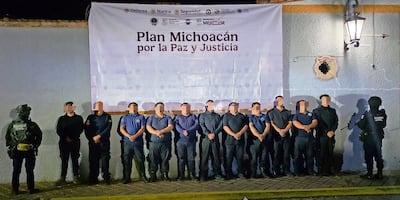Más Información

Trabajamos para frenar el flagelo del fentanilo: embajador Johnson; destaca encuentro con gabinete de Seguridad

Diputados aprueban reforma para reducir jornada laboral de 40 horas hasta 2030; la mandan a las legislaturas locales

Zar antidrogas de EU se reúne con Harfuch tras operativo contra “El Mencho”; acude a Palacio Nacional junto a embajador Johnson

Morena suspende derechos políticos de Sergio Mayer; Comisión de Honestidad señala "impacto negativo a imagen del movimiento"

Abren 7 investigaciones contra funcionarios por huachicol fiscal, revela Sheinbaum; “sin distinción de jerarquías o filiaciones políticas”
Latin America has the highest rate of female homicides in the entire world. It is a region known for its “machismo” culture and a general “tolerance” towards violence against women and children, with a widespread lack in official statistics and inefficient public policies that lead to the few cases that actually do get reported going unpunished.
In view of the International Day for the Elimination of Violence against Women, leaders from across Latin America have launched a 16 day-long campaign aimed at raising funds and putting an end to gender-based violence as part of the UN's 2030 Agenda for Sustainable Development.
The Economic Commission for Latin America and the Caribbean (Cepal) recently revealed that on average, 12 women are victims of female homicides per day in the region. If this terrifying and alarming figure continues as is, over the next 12 years there will be around 54,000 female victims; to put that into perspective, that's the entire population of the Federation of Saint Kitts and Nevis in the carribeans.
Furthermore, of the 25 most violent countries in the entire world, 14 are in Latin America.
Adriana Quiñones, the Manager for the UN Trust Fund to End Violence against Women, told EFE, a Spanish international news agency, that these statistics are evidence of the fact that there “is widespread tolerance towards violence against women” in the region.
Although these figures don't fully represent reality since so many cases go unreported, Quiñones explains that they show government officials' failure to really put an end to female homicides.
“The data we gathered in each country differs greatly because there are way too many prejudices. They're referred to as crimes of passion that usually aren't investigated and end up going unpunished. We don't really have official government data,” she said.
Economic codependency and early marriages are the main reasons why women succumb to domestic violence. Many of these women drop out of school and “start their reproductive lives and domestic responsibilities at a very early age,” continued Adriana Quiñones.
According to the World Health Organization, Brazil has the fifth highest rate of female homicides in the entire world, with 4.8 homicides per 100,000 women.
Argentina has a female homicide rate of 0.5 every 30 hours. In 2016, there have been 271 female homicides reported so far and according to a national poll, 97% of Argentinean women say they've suffered some sort of harassment in both public and private spaces.
In Mexico, an average of 7 women were murdered every day between 2013 and 2015. Between 2001 and 2006 that figure was literally half.
Peru reported 108 female homicides so far this year.
In Central America, Guatemala tops the list where through October 31 of this year, 630 female homicides were reported. Honduras reported 228 female homicides between January and June (one every 18 hours)
During the first quarter of this year alone, El Salvador reported 154 female homicides and Nicaragua reported 45.
Quiñones argues that these countries' governments aren't doing enough to put an end to gender-based violence. “There are incredibly progressive laws across the region, but they're not actually implemented because when women turn for help, local governments don't have the resources to actually help them.”
In addition, according to the UN Women offices, murder is the end in a long chain of violence that Inwomen suffer.
In many cases, explains Quiñones, “it's when women actually build up the courage to leave an abusive relationship or start a new relationship when they end up being murdered.”
According to Quiñones, many women don't report the first stages of domestic abuse out of fear or because they don't trust the government or believe that they can actually help them.
“If women try to find help but they face a public servant who doesn't even listen to them, they're obviously not going to feel motivated to report the crime.”
The countries with the lowest rates of homicide are Costa Rica and Panama, with 19 and 14 homicides reported through August 2016, respectively. Puerto Rico reported 10 female homicides over that period.
“The first step is to spread public awareness about the human rights of women,” said Quiñones who argued that countries in Latin America must make gender-based violence a national priority and not only pass legislation, but actually word towards creating a society with real equality for women.
Noticias según tus intereses
[Publicidad]
[Publicidad]









